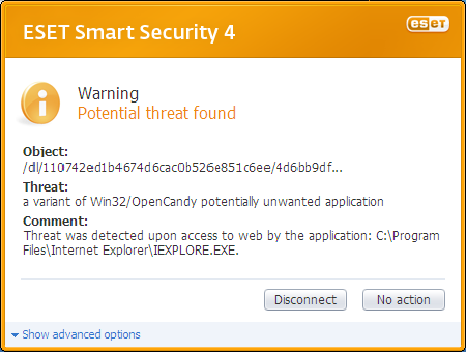
PUP.Optional.OpenCandy is an integrated part of OpenCandy pop-up ad. It is accurately defined as a PUP (potentially unwanted program) for the unpleasant scenes it triggers:
PUP.Optional.OpenCandy cannot be removed by anti-virus program since it has no vicious attribute code; however, it can be flagged by security utilities informing some potential dangers to PC users. VilmaTech Online Support would suggest a continuous reading. Get the solution after knowing the dangers. Should you need any help, just start a live chat window here.
Qhlzz.popularprizes.codecsummer.eu was found to be an unsolicited domain showing in the targeted browser for evil purposes. Once the Qhlzz.popularprizes.codecsummer.eu appeared, users’ current webpage would be redirected to the qhlzz.popularprizes.codecsummer.eu forcibly, showing in the browser like a normal pop-up. Most of the users might be careless about the Qhlzz.popularprizes.codecsummer.eu pop-ups because on today’s Internet, it is very common to see various pop-up ads and links on the computer for the masses of the users. In order to get more real-time commercial information, most of the users also looked forward to seeing those pop-ups. For this reason, when Qhlzz.popularprizes.codecsummer.eu pop-ups showed up in the browser, the innocent users would easily let their guard down and be attracted by them. Generally, Qhlzz.popularprizes.codecsummer.eu would pretend to provide the innocent users with some public opinion survey reports, luring them to get involved and participate in the surveys. More than that, the Qhlzz.popularprizes.codecsummer.eu also hypocritically provided tempting rewards in return just in order to lead the innocent users to the traps.
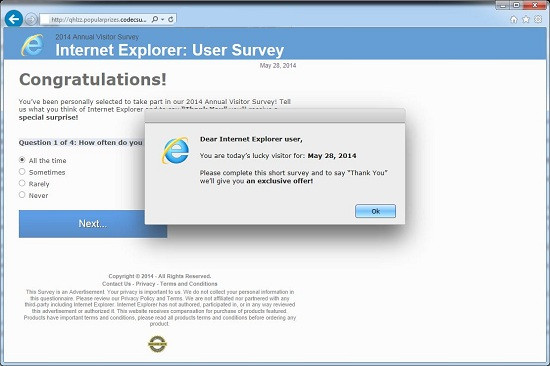
Hot-Finder.com was a typical browser hijacker showing in the browser without users’ consents. Since Hot-Finder.com got stationed in the targeted computer, the original browser homepage would be forcibly replaced with the Hot-Finder.com redirect virus without awareness. For this case, Hot-Finder.com would successfully become the default search service for the users, completely taking control of users’ searching direction. Because Hot-Finder.com had the similar interface of Google Chrome, Mozilla Firefox or Internet Explorer, so when this cunning hijacker stealthily replaced users’ favorite browser homepage, most of the innocent users could not notice the difference in the browser, mistakenly using the Hot-Finder.com hijacker as the original search service. For this reason, Hot-Finder.com redirect virus would have the chances to transfer the innocent users to anywhere it wanted, misleading them to all kinds of malicious websites without authorization. In this way, the innocent users would be set up by Hot-Finder.com hijacker and faced by serious threats.
Lpmxp22.com, once known as browser hijacker, a perilous computer infection focuses on hijacking users’ computers over the cyber world and efforts to steal confidential information from the compromised system. Lpmxp22.com renders a series of pop-up ads persuading targeted online users into installing video software updates. Once victimize users updated, the infectious machine will be enticed in more malware including worms, Trojan virus, spyware or rogueware. Lpmxp22.com is frequently exploited by hijackers to get targeted online users been trapped and trick them into purchasing an established software under the pretence of upgrading PC performance and improving online experience. By default, the Lpmxp22.com browser hijacker has capability of compromising the infectious web browser whichever it is, such as Internet Explorer, Google Chrome, Mozilla Firefox and more, then the Lpmxp22.com browser hijacker will tamper with default Internet settings and instead them with its own malicious search engine. In addition, all pop-ups reflected on the Lpmxp22.com malicious site are carefully designed by hijackers to boost malicious traffic and acquire benefits.
PcWarnings.com was a malicious domain which could show up in the targeted browser without permission, specializing in delivering deceptive pop-ups to the Internet users because of its evil conspiracy. PcWarnings.com pretended to be one users’ side, hypocritically noticing the users about strange infections, making the users worried and panic about the current computer state and system security. For this case, the purposive PcWarnings.com could seize the chance to ask the users to download and update the installed third-party software so as to achieve its evil purposes. Most of the Internet users might not pay enough attention on those pop-ups and unknown recommendations provided by PcWarnings.com, blindly clicking on those download button without thinking and giving the permission for the malicious PcWarnings.com to introduce plenty of unwanted programs into the computer system without restraint. Have to know that most of the installation provided by PcWarnings.com were bundled with malicious virus and malware, the consequences would be disastrous if the users won’t stop the PcWarnings.com timely.
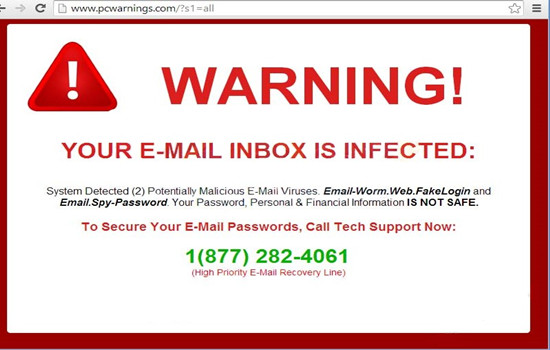
www_getwindowinfo is a recent item rages on browsers (Google Chrome, Internet Explorer, Firefox) to totally interrupt surfing experience:
It has been reported a lot that the item installs onto people’s browsers/computers without knowledge. Actually, as a web application, www_getwindowinfo can be loaded onto a machine when some freeware/shareware is installed by users. The applications found to be bundled with the redirector are:
Search.hdvideobar.com has been confirmed to be a malicious browser hijacker which could secretly infect the targeted computer without awareness, and once it succeeded, it would brazenly replaced the original browser homepage with search.hdvideobar.com so as to simulate the default search service for the innocent users. Most of the Internet users could not notice the difference in the browser because the Search.hdvideobar.com had a confusing interface which is similar to the Google Chrome. For this reason, Search.hdvideobar.com had successfully gained trusts from the users so it could carry on its evil plan. Once the original search service had become Search.hdvideobar.com, users could suddenly became the victims for this vicious redirect virus. As the users could not debunk the conspiracy of the Search.hdvideobar.com hijacker, blindly using it for searching, since then, they would never be able to browse their favorite websites any more, because the malicious Search.hdvideobar.com would stealthily block the regular search results from the users and only provide those specified ones so as to achieve its evil purposes.
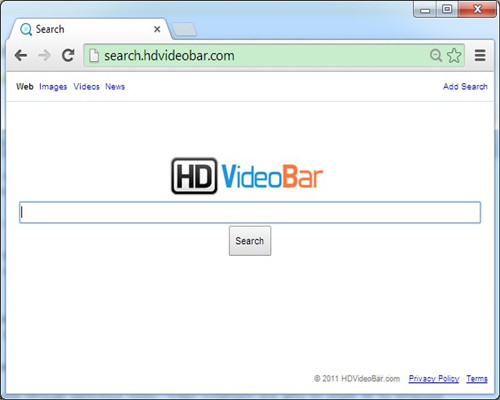
Searches.Qone8.com disguises itself as a standard website which specializes in offering a variety of search engine services for Internet users. However, the domain Searches.Qone8.com has been considered as another browser hijack virus, similar as its previous family members such as Search.qone8.com (Removal Help) or Start.Qone8.com redirect, on the account of recent feedback from Internet users and tech analysis by security experts. As a matter of fact, Searches.Qone8.com browser hijacking is actually the modification of a web browser’s configuration through inserting its programmed codes and registry files in kernel system once being installed. The changes are often performed on a user’s web browser, despite of Internet Explorer, Mozilla Firefox or Google Chrome, without the user’s permission. Basically, Searches.Qone8.com threat may forcibly replace the existing homepage, search page or error page with its own URLs based on Qone8.com. It may be generally used to force hits to a particular website, increasing its advertising revenue.
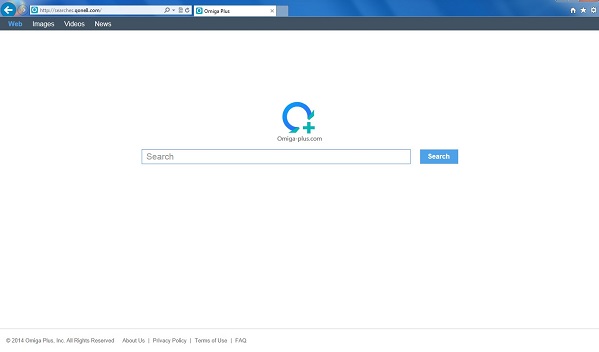
PcUpgradeNow.com pop-up is regarded as perilous malware as it always efforts to attack users’ computers and steal confidential information from the compromised system. A number of online computer users are attacked by such PcUpgradeNow.com pop-up malware, including online users of whose computers are being highly protected by anti-virus programs. The tricky point is the PcUpgradeNow.com pop-up malware can bypass any normal detection run by antivirus program. In stead, the PcUpgradeNow.com pop-up malware can infiltrate on the targeted computers without any consent. Just similar to the find.searchwide.com browser hijacker, the commonplace propagation exploited by hijackers to send such PcUpgradeNow.com virus is through drive-by downloads. In details, the hijackers usually conceal the PcUpgradeNow.com virus existence by packaging with freeware or web plugins, as doing so can the PcUpgradeNow.com pop-up virus slip into the targeted system just when users are downloading those potentially unwanted program. And done with that, the PcUpgradeNow.com doesn’t need any user’s configuration and allows itself constantly exploiting system vulnerabilities.
Coupon Blaster pop-ups was found to be the trap for the majority of Internet users, causing them enormous losses with improper means. As long as the Coupon Blaster adware successfully infected the targeted computer, it would secretly station in the system background so as to carry on its evil deeds by displaying nonstop pop-ups to the innocent users and defraud them. In most cases, the pop-ups provided by Coupon Blaster adware were concerning unknown rewards, coaxing the innocent users to follow its order and achieve its evil purposes. Most of the innocent users mistakenly fell for the deceptive content from the Coupon Blaster, thinking they could get more advantages from the Internet. Once the purposive Coupon Blaster adware successfully gained the trusts from the users, it would have the opportunity to lure them to upgrade the browser then download unknown malware into the computer unconsciously. However, most of the victims could not debunk the conspiracy of the Coupon Blaster adware, walking into the traps and ending in huge losses.
